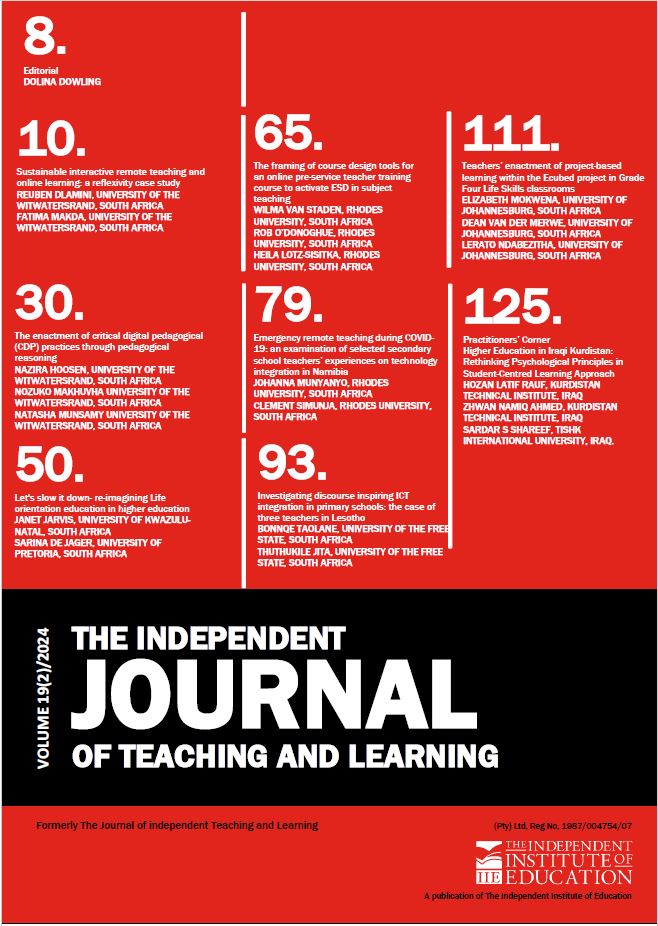The enactment of critical digital pedagogical (CDP) practices through pedagogical reasoning.
DOI:
https://doi.org/10.17159/97569m49Keywords:
critical digital pedagogy, pedagogical reasoning, expanded transformative learning theory, reflective practice, reflective journalAbstract
AbstractThis study examines the influence of educator beliefs and pedagogic awareness apropos of their teaching practices due to the invisible nature of pedagogical reasoning especially when facilitating in online teaching environments. The research question focuses on the role of pedagogical reasoning in the enactment of critical digital pedagogy (CDP) at a Centre for Learning, Teaching and Development (CLTD) mandated to support academics. A transformative learning theory lens and the model for pedagogical reasoning and action was employed as the theoretical analytical framework. This study aligns with the qualitative paradigm and considers pedagogical reasoning in CDP practices through a reflective journal as a research instrument and data source. Thematic analysis was engaged in to identify underlying themes. The study foregrounds the importance of reflection through pedagogical reasoning thereby showing how critical practice in CDP endorses the outline and enactment of inclusive teaching settings in blended learning (BL) environments.
References
Abrahams, F. (2005). The application of critical pedagogy to music teaching and learning.
Visions of Research in Music Education, 6(1), 6.
Ashwin, P., Boud. D., Coate, K., Hallett, F. & Keane, E. (2015). Reflective teaching in higher education. Bloomsbury Publishing.
Bartlett, L. (2005). Dialogue, Knowledge, and Teacher‐Student Relations: Freirean Pedagogy in Theory and Practice. Comparative Education Review, 49(3), 344-364. Retrieved 13 November 2023 from https://doi.org/10.1086/430261
Birmingham, C. (2004). Phronesis: A model for pedagogical reflection. Journal of teacher education, 55(4), 313-324.
Bolton, G. & Delderfield, R. (2018). Reflective Practice: Writing and Professional Development. (5th ed.) Sage. London.
Bucklow, C. & Clark, P. (2000). The Role of the Institute for Learning and Teaching in Higher Education in Supporting Professional Development in Learning and Teaching in Higher Education, Teacher Development, 4(1), 7-13.
Christie, M. et al. (2015). Putting transformative learning theory into practice. Australian journal of adult learning, 55(1), 9-30.
Cohen, L., Manion, L. & Morrison, K. (2002). Research methods in education. (5th ed.) Routledge. London.
Connelly, F. M. & Clandinin, D. J. (1990). Stories of Experience and Narrative Inquiry. Educational Researcher, 19(5), 2-14. Retrieved 5 December 2023 from https://doi.org/10.3102/0013189X019005002
Cranton, P. (2016). Understanding and promoting transformative learning. (3rd ed.) Sterling, VA: Sense Publishing.
Denzin, N. K. & Lincoln, Y. S. (2002). The qualitative inquiry reader. Sage.
Dewey, J. (1930). Democracy and education: An introduction to the philosophy of education. Macmillan New York. Retrieved 9 November 2023 from https://iwcenglish1.typepad.co m/Documents/dewey_democracy_and_education.pdf
Fernandez, C. (2014). Knowledge base for teaching and pedagogical content knowledge (PCK): Some useful models and implications for teachers’ training. Problems of Education in the 21st Century, 60(1), 79-100. Retrieved 9 November 2023 from 457-1421876658.pdf (oaji.net).
Freire, P. (1970). Pedagogy of the oppressed. Continuum.
Hodges, C. B., Moore, S., Lockee, B. B., Trust, T. & Bond, M. A. (2020). The difference between emergency remote teaching and online learning. Educase Review, Friday, March 27, 2020.
Hooks, B. (1996). Teaching to transgress: Education as the practice of freedom. Journal of Leisure Research, 28(4), 316.
Hoosen, N. (2022). The praxis of critical digital pedagogic practices in initial teacher education. In J. P. Makonye & N. S. Ndlovu (Eds.) Innovations in online teaching and learning: Case studies of teacher educators from South Africa during the COVID-19 era, 43-64. AOSIS Books. Cape Town.
Hoosen, N. (2023). A critical review of academic practice and integrated edtech use at a South African University: the ‘real’ level’. PhD thesis, University of Witwatersrand, Johannesburg. Retrieved 7 February 2024 from https://www.wits.ac.za/media/wits-university/faculties-and- schools/humanities/research-entities/link/documents/theses-amp- dissertations/Hoosen%202023%20-%20PhD%20Thesis.pdf
Jasper, M. A. (2005). Using reflective writing within research. Journal of Research in Nursing, 10(3), 247-260. Retrieved 13 October 2023 from https://doi.org/10.1177/174498710501000303
Mascolo, M. F. (2015). Neo-Piagetian theories of cognitive development. International Encyclopedia of Social & Behavioral Sciences, (2nd ed.) Major Reference Works. Elsevier. https://dx.doi.org/10.1016/B978-0-08-097086-823097-3
Masood, M. M. & Haque, M. M. (2021). From critical pedagogy to critical digital pedagogy: a prospective model for the EFL classrooms. Saudi Journal of Language Studies, 1(1), 67-
80. Retrieved 4 November 2023 from https://doi.org/10.1108/SJLS-03-2021-0005
Mezirow, J. (1991). Transformative dimensions of adult learning. ERIC, Jossey-Bass. San Francisco.
Moon, J. A. (2006). Learning journals: A handbook for reflective practice and professional development. Routledge, London.
O’Connell, T. S. & Dyment, J. E. (2011). The case of reflective journals: is the jury still out? Reflective Practice, 12(1), 47-59. Retrieved 13 October 2023 from https://doi.org/10.1080/14623943.2011.541093
Phelps, R. (2005). The potential of reflective journals in studying complexity in action.
Complicity: An international journal of complexity and education 2(10), 37-54.
Popkewitz, T. S. (1993). Changing patterns of power: Social regulation and teacher education reform. State University of New York Press. Retrieved 14 November 2023 from https://books.google.com/books?hl=en&lr=&id=Q1DWOgtHlMoC&oi=fnd&pg=PR7&dq= popkewitz+thomas+1993&ots=sEc4Mq-Mr_&sig=aOQmzWPw4ZBoHVKyE88pBKVT5qM
Rowell, C. (2022). Blog posted on Wednesday 06 April 2022. What is Critical Digital Pedagogy? Retrieved 21 October 2023 from https://totallyrewired.wordpress.com/2022/ 04/06/what-is-critical-digital-pedagogy/
Shulman, L. (1987). Knowledge and teaching: Foundations of the new reform. Harvard educational review, 57(1), 1-23.
Smith, A. & Seal, M. (2021). The contested terrain of critical pedagogy and teaching informal
education in higher education’ Education Sciences, 11(9), 476.
Sykes, P. & Gachago, D. (2018). Creating ‘safe-ish’ learning spaces - attempts to practice an ethics of care. South African Journal of Higher Education, 32(6), 83-98.
UNESCO (2015). Position Paper on Education Post-2015, Retrieved 9 October 2023 from http://unesdoc.unesco.org/images/0022/002273/227336E.pdf 10.5040/9781849666275
Downloads
Published
Issue
Section
License
Copyright (c) 2024 The Independent Journal of Teaching and Learning

This work is licensed under a Creative Commons Attribution 4.0 International License.






.png)